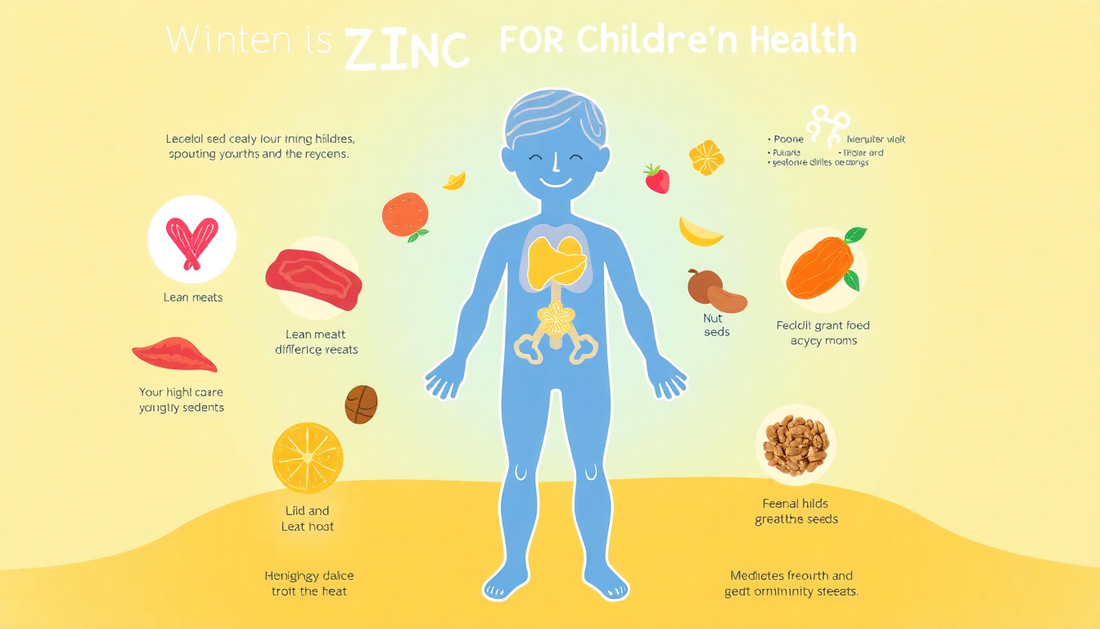
Zinc for Kids: A Comprehensive Guide to Health and Immunity in 2025
Share
In the ever-evolving landscape of children's health, one essential nutrient has consistently stood out as a cornerstone of growth, development, and immune resilience: zinc. As we approach the year 2025, the importance of this mineral for our little ones has only become more pronounced, with new research shedding light on its multifaceted benefits.
Understanding Zinc Deficiency
Zinc deficiency is a prevalent issue, affecting an estimated 17% of the global population, with children being particularly vulnerable. The symptoms of zinc deficiency in children can be subtle, yet far-reaching. Stunted growth, frequent infections, delayed wound healing, and even cognitive impairments can all be indicators of an insufficient zinc intake.
The risk factors for zinc deficiency are varied, ranging from dietary habits and socioeconomic status to underlying medical conditions. Children living in poverty, those with gastrointestinal disorders, and those following restrictive diets are among the most susceptible. Addressing zinc deficiency early on is crucial, as the long-term implications can include impaired immune function, compromised neurological development, and an increased risk of chronic diseases later in life.
The Benefits of Zinc for Kids
The role of zinc in children's health is truly multifaceted. From bolstering the immune system to supporting growth and cognitive function, this essential mineral is a powerhouse for young, developing bodies.
Immune System Support
Zinc is a key player in the proper functioning of the immune system. It helps to stimulate the production and activity of white blood cells, which are the body's first line of defense against pathogens. By enhancing the immune response, zinc can help children ward off common childhood illnesses, such as the common cold, flu, and even more severe infections.
Growth and Development
Zinc is crucial for the proper growth and development of children. It plays a vital role in cell division, protein synthesis, and the metabolism of nutrients essential for growth. Adequate zinc intake has been linked to improved linear growth, as well as the healthy development of bones, muscles, and other tissues.
Cognitive Function
The impact of zinc on cognitive function in children is equally remarkable. This mineral is essential for the proper development and function of the brain, supporting everything from memory and attention to problem-solving and learning abilities. Zinc deficiency has been associated with impaired neurological development and a higher risk of learning disabilities.
Wound Healing
Zinc is also a key player in the wound healing process. It helps to promote the formation of new skin cells and supports the production of collagen, which is essential for tissue repair. This makes zinc an important nutrient for children, who are prone to scrapes, cuts, and other minor injuries during their active play and exploration.
Best Zinc Gummies of 2025
As the awareness of zinc's importance for children's health continues to grow, the market for zinc supplements has evolved significantly. In 2025, parents have access to a wide range of high-quality zinc gummies that cater to the unique needs of growing children.
When selecting the best zinc gummies for your child, it's important to look for products that use high-quality, bioavailable forms of zinc, such as zinc citrate or zinc gluconate. Additionally, consider gummies that are free from artificial additives, colors, and sweeteners, and opt for those that contain complementary nutrients like vitamin C, which can enhance zinc absorption.
The recommended daily zinc intake for children varies by age, with younger children needing less and older children requiring more. It's always best to consult with a healthcare professional to determine the appropriate dosage for your child.
Natural Sources of Zinc
While zinc supplements can be a convenient way to ensure your child is getting enough of this essential mineral, it's also important to focus on incorporating zinc-rich foods into their diet. Some of the best natural sources of zinc include:
- Meat, poultry, and seafood (especially oysters, crab, and lobster)
- Legumes, such as beans, lentils, and chickpeas
- Nuts and seeds, including pumpkin seeds, cashews, and almonds
- Whole grains, such as quinoa, brown rice, and oats
- Dairy products, like cheese and yogurt
By encouraging a balanced, zinc-rich diet, you can help your child meet their daily needs through natural food sources, while also promoting overall nutritional well-being.
Safety and Considerations
While zinc is generally considered safe for children when taken in appropriate amounts, it's important to be mindful of potential side effects and to consult with a healthcare professional before starting any supplementation regimen.
Excessive zinc intake can lead to nausea, vomiting, loss of appetite, abdominal cramps, diarrhea, and, in rare cases, more serious complications. It's crucial to follow the recommended dosage guidelines and to be aware of any interactions with other medications or supplements your child may be taking.
If you have concerns about your child's zinc status or are considering zinc supplementation, it's always best to speak with a pediatrician or a registered dietitian. They can help you develop a personalized plan to ensure your child is getting the right amount of this essential mineral.
Conclusion
As we look towards the future, the importance of zinc for children's health and immunity will only continue to grow. By understanding the signs of zinc deficiency, the wide-ranging benefits of this mineral, and the best ways to ensure your child is getting enough, you can empower yourself to make informed decisions that support their overall well-being.
Remember, a proactive approach to zinc nutrition can set your child up for a healthier, more resilient future. So, let's embrace the power of zinc and work together to build a brighter, stronger generation in 2025 and beyond.
